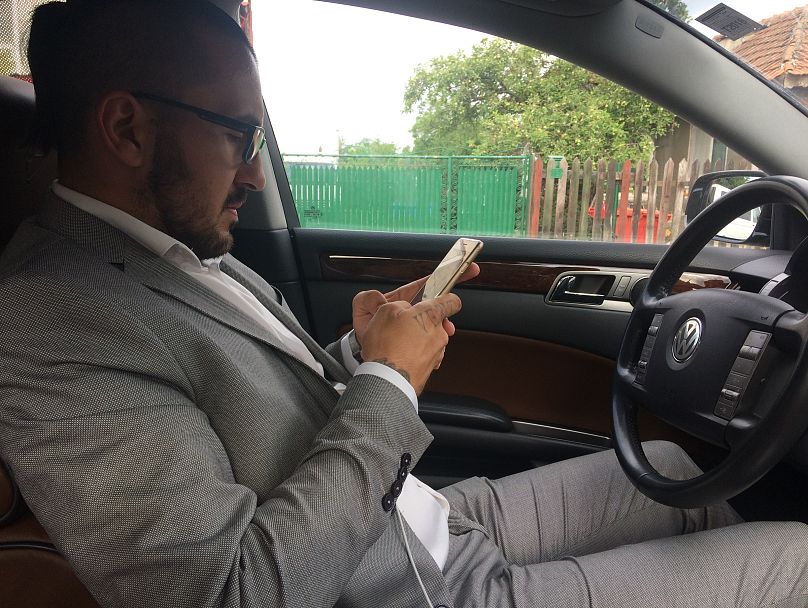Alex Bobes runs a free taxi service in Romania. He says he wants to set an example to show that even with a full time job, and a family, everyone can offer something to their communities.
It’s 7.00am in the morning and smart German car is crawling through a traffic jam in the Romanian capital Bucharest. Its driver is 28-year-old Alex Bobes, an IT project manager wearing a suit that almost conceals his tattoos. He's heading to work and although he's been in the car for an hour already, he's going to be late, as he often is. But he's not worried because his boss knows why.
Five years ago, Alex Bobes founded the Taxi Gratis (Free Taxi) to offer free transport for people with disabilities or for those suffering from severe diseases who can’t afford to keep a car. He offers his time, his car and pays the petrol to help them get around.
Bobes was inspired by personal experience. His mother died of cancer and he remembers the struggle he had when she needed to get to hospitals for treatment on a daily basis, at a time when he didn’t have a car and couldn't afford a taxi or a private ambulance.
“I had this idea to try to help those people in similar situations to mine, at least with the transport, to try to get involved and to help as many people as possible with my own car,” Bobes says.
Initially, the project was a website and a Facebook page to help him spread the word about his services. The system is simple: people call Alex a few days in advance, with confirmation a day ahead, and book a ride.
"A miracle"
Today's “client” is Daniel Ianos who lives in Buftea, a town 20 kilometres away from Bucharest, in the residential area of the capital.
“This Taxi Gratis project is a miracle, […], I couldn’t believe it was free,” Ianos tells Euronews.
When Ianos was born, the whole family thought the boy inherited the blue pale eyes of his father. But when the doctors saw that the baby couldn’t pick out his toys, they figured out that his faraway look was actually a medical problem. The diagnosis came later: Daniel Ianos suffers from cataracts and spastic tetraparesis.
Now, at 32 he has completely lost the sight in his left eye and can’t see in long distance with his right.
To avoid total blindness, he needs 3800 RON (816 euros) for surgery, an amount he can’t afford.
His monthly benefits from the state amount to 1000 RON (214 euros).
So finding cash to travel is always a problem.
“In this country, people with special needs have little freedom of movement,” Ianos says.
Even when he could get together the 20 euros he needed for a taxi into the centre of town, Ianos recalls that not all drivers were keen to take on a disabled passenger: “I don’t want the hassle of taking you,” he recalls being told.
Ianos found out about Taxi Gratis from an NGO providing aid for disabled people and this is the fourth time in a year that he has taken a free ride.
Today he is visiting an association he hopes will help him to join an integration programme for people with disabilities.
But Bobes' ultimate destination is the office, where he works between 9:00 and 18:00. Although he can't offer a lift home to Ianos, he calls the taxi firm where his brother works and books a professional driver to do the job, paying himself.
"Do something"
For the time being, Taxi Gratis is Alex Bobes. In the past he had two or three volunteers helping out with the rides, but he couldn’t rely on them. He remembers that there were instances when somebody called to schedule a lift, but in the end, the volunteer didn’t show up.
“I don’t like these things: if I say I will do something, I do it,” Bobes declares.
“I have a family, a job, different activities, if I find few free hours a week to help, certainly others can too,” he says.
Two months ago he registered his idea as a not-for-profit association.
“I set up the association, because all these years, despite all my efforts, I couldn’t manage to develop this project, I couldn’t find more volunteers,” he declares.
Through the association he hopes to have access to more funds, from sponsors or through tax breaks. Ultimately he'd like to by a car adapted for special-needs passengers and engage a full-time driver.
Out of at least five requests a week, Taxi Gratis can only fulfil two or three. But Bobes has no idea how many people have travelled in his car-
“It’s not important how many people you help, it is important to do something,” Bobes observes as he pulls up at his office.
“I wanted this project to be an example, I would be happy if I see people involving in helping others, not necessarily in my project, but to do something for other people.”
#Europeanheroes
E_uronews wants to hear from #Europeanheroes like Bobes: ordinary people doing ordinary jobs who make a difference. If you know someone like this, please get in touch via europeanheroes@euronews.com_












